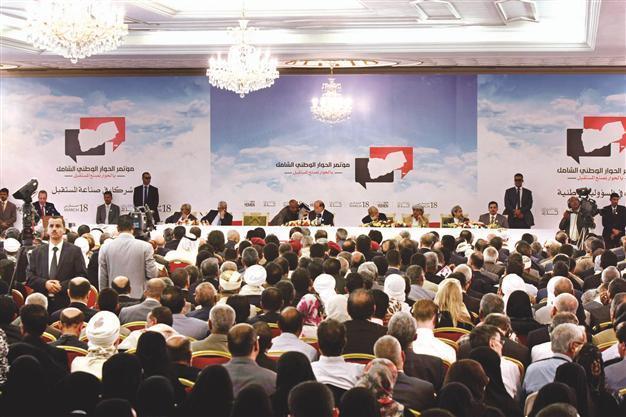Yemen holds dialogue meeting amid protests
SANAA, Yemen

The national dialogue brings together Yemen’s various political groups. AP photo
Yemen launched yesterday a U.N.-backed national dialogue aimed at paving the way towards a new Constitution and elections.
The talks are, however, being boycotted by hardline southern factions who staged a general strike and protests in the port city of Aden on March 17 against the initiative.
The dialogue, scheduled to run six months, brings together 565 representatives of Yemen’s various political groups, from secessionists in the south to Zaidi Shiite militants in the north, in addition to civil society representatives.
They aim to draft a new Constitution and prepare for general elections in February 2014, after a two-year transition led by President Abdrabuh Mansur Hadi.
The dialogue was being held as per the U.N.-brokered deal that eased former strongman Ali Abdullah Saleh out of office following an 11-month uprising against his 33-year rule. The talks, originally scheduled to start in mid-November, were delayed mainly due to the refusal of factions in the Southern Movement, campaigning for autonomy or secession for the formerly independent south, to join the talks.
Most factions have finally agreed to take part after months of negotiations and under UN pressure.
But the movement’s hardliners led by South Yemen’s former president Ali Salem al-Baid have dug in their heels, insisting instead on negotiations between two independent states in the north and south.
On Sunday, thousands of their supporters protested against the national dialogue, demanding that their region be seceded from the north.
Protesters carrying placards saying, “No dialogue under occupation!, Independence is our choice!” demonstrated in the port city of Aden waving flags of the formerly independent South Yemen which was united with the north in 1990.
“We are here by the thousands to reject the dialogue as it is an issue of northerners and those southerners who are involved in it do not represent the people,” Khaled Junaidi, an activist told AFP.
On February 15, the United Nations voiced support for the national dialogue and threatened sanctions against any party impeding the talks, mainly referring to Saleh and Baid.
Despite his ouster, Saleh remains head of the formerly ruling General People’s Congress Party (GPC).
But a source from the dialogue’s preparatory committee told AFP that he will not represent his party at the talks, in which it has been granted the lion’s share of seats with 112 representatives.
Yemeni Nobel peace laureate Tawakkul Karman, an icon of the uprising against Saleh’s rule, also boycotted the dialogue in protest at what she said is the marginalisation of the youth and the participation of Saleh-era officials.
“I will not participate in the dialogue, due to the obvious imbalance in the representation of the youths, women and civil society groups and the participation of people who have the blood of the revolution youth on their hands,” she told AFP.
Karman also criticised the government for not applying the full terms of the UN-backed agreement which stipulates restructuring security apparatus.
“This was not the dialogue we had called for. We will work outside the dialogue to press the transitional government and president to achieve our demands including the reunification of the army, the release of detainees, and a probe into the crackdown” on anti-Saleh protesters in 2011.
In addition to the southern question, Zaidi Shiite rebels, who have mounted repeated uprisings in the far north since 2004, have clashed with Sunni Salafists in northern Yemen. They are both taking part in the dialogue.
But influential tribal chief Hamid al-Ahmar, who heads the powerful Sunni Islamist Al-Islah (reform) Party, will not represent his party at the conference in protest against the Zaidis being handed most seats representing the northern Saada province, organisers said.
The Southern Movement is represented at the talks by 85 seats while the Zaidi rebels have 35 representatives.
